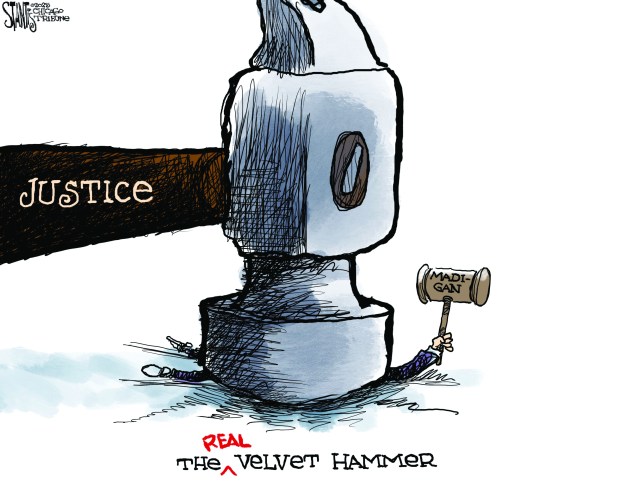I met Agather Atuhaire, a Ugandan human rights defender, in late May at the Oslo Freedom Forum, an event celebrating activists against authoritarianism. She was petite but powerful, bruised but not broken. Traveling to this event was her latest act of defiance.
Only days earlier, she and Boniface Mwangi, a high-profile Kenyan activist, had been dumped near the Tanzanian border after being detained and tortured for days by Tanzanian police when they tried to attend the trial of Tanzania’s main opposition leader. The abuse was excruciating. They recounted being stripped, hung by their bound feet and hands, brutally raped and beaten. The entire sick process was recorded to elicit shame and more fear.
I spent years working in East Africa, so I’m familiar with its explosive politics and the authoritarian tendencies of those clinging to power. But this felt like something new. Atuhaire received the U.S. State Department’s International Women of Courage Award just last year.
Where was the outrage? Once, the U.S. government used its influence to prevent these abuses. Now, Washington is practically silent.
Repression has been on the rise across the region. When governments stop trying to hide or temper their abuse, the dangers escalate. Cross-country cooperation in governmental repression is ticking up too.
Tundu Lissu, the politician Atuhaire and Mwangi were in Tanzania to support, was arrested in April and charged with treason after spearheading a campaign ahead of Tanzania’s upcoming elections. Tundu was fighting for reforms to unrig a system that has enabled the ruling party to win every election since independence.
Several other critics of the Tanzanian government have been abducted over the last year. One opposition party official was killed after being taken from a bus in September. His body was later found soaked in acid and beaten.
Maria Sarungi Tsehai, a prominent Tanzanian activist, was abducted in January in Nairobi, Kenya, where she had been living since seeking asylum there in 2020 because of threats from the Tanzanian government. After a few hours of assaulting her as they tried to gain access to her phone and social media, Tsehai’s abductors dumped her on a side road. Tsehai was also in Oslo and told me she was certain the Tanzanian and Kenyan authorities were working together to repress their citizens, so nowhere was safe now.
In November, Ugandan opposition politician Kizza Besigye and his aide were also abducted in Nairobi, only to emerge four days later in military court in Kampala, Uganda. Kenyan authorities have since admitted to cooperating in the kidnapping. These are just some of the hundreds of civilian opposition actors to face military courts in Uganda, even though the country’s supreme court has ruled it unconstitutional.
Yoweri Museveni has ruled the country since 1986. His son, Muhoozi Kainerugaba, is the chief of Uganda’s Defense Forces and recently bragged on social media of capturing an opposition leader, holding him captive in his basement, and torturing him.
Perhaps the Kenyan government has become more amenable to facilitating repression in the region since it’s upped its own at home. Last June, Kenya saw a wave of antigovernment protests led by Kenya’s youth. Kenyan police killed dozens in their aggressive response. Waves of protests continued throughout the year, and in the final weeks of 2024, at least 10 young activists were abducted.
As a former U.S. diplomat, I expected more of an American response to these events. It wouldn’t prevent all the abuses, but it would have mattered. Activists I’ve spoken with have assured me, for example, that the abuse of Mwangi and Atuhaire wouldn’t have occurred under prior U.S. administrations (even Donald Trump’s first administration), since the Tanzanian government would have anticipated consequences.
The United States has provided these countries with military assistance and development and humanitarian support for many years. But America has a very different relationship with the region today. Though some advocates in Congress continue to speak up, the Trump administration has made clear that it will not use its influence to fight human rights abuses. Not only has it gutted foreign assistance, which could previously be used as an incentive for better behavior, but it also has explicitly stepped back from promoting human rights at all.
The weight of America’s moral leadership has been weakening for years, but it is now wholly broken. And the consequences, on individuals and democracy movements across the globe, are real and likely to worsen.
You may think it isn’t America’s business to promote human rights internationally, but it was never much of an investment. Prior to the Trump administration’s draconian cuts, the entire foreign aid budget amounted to less than 1% of the country’s expenditures, and only 3.2% of that went to democracy, governance and human rights programs.
But by using our diplomats and assistance to impose even a small cost for the worst repression, we once helped protect and uplift those fighting for values we used to hold dear.
What will we gain by not doing so? Nothing, but it will cost others plenty.
Elizabeth Shackelford is senior policy director at Dartmouth College’s Dickey Center for International Understanding and a foreign affairs columnist for the Chicago Tribune. She was previously a U.S. diplomat and is the author of “The Dissent Channel: American Diplomacy in a Dishonest Age.”
Submit a letter, of no more than 400 words, to the editor here or email letters@chicagotribune.com.



